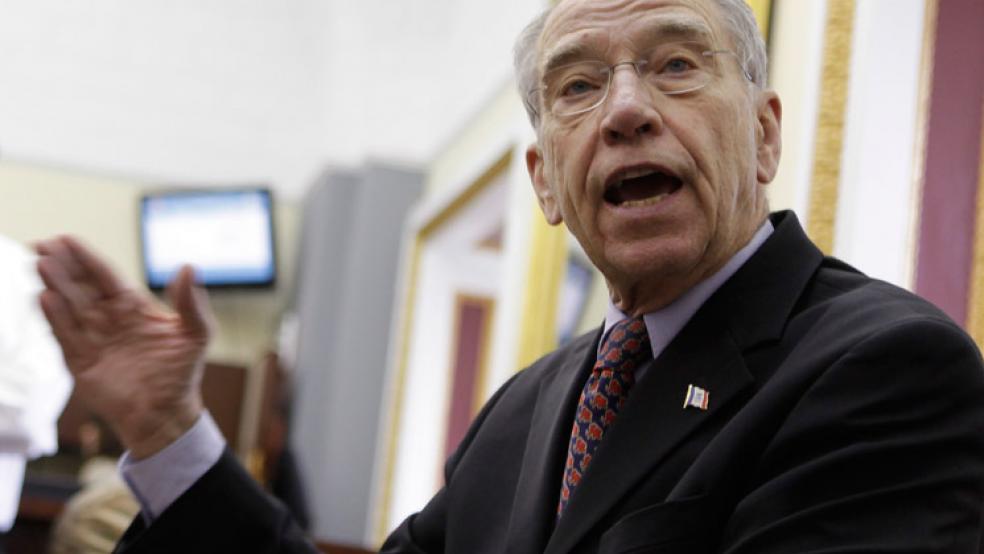Tuesday could be a watershed moment in the push to lower U.S. prescription drug prices. Seven top executives from leading pharmaceutical companies will be on the congressional hot seat as the Senate Finance Committee holds a hearing on their prices.
“The Senate Finance Committee hearing is an ominous signal for the drug industry that major legislative reform is on the horizon,” Politico’s Sarah Karlin-Smith writes. “It’s reminiscent of previous hearings with businesses that proved to be turning points, leading to massive reforms of Wall Street banks, the health insurance industry and tobacco companies.”
Who’s getting grilled: Top executives from drug companies AbbVie, AstraZeneca, Bristol-Myers Squibb, Johnson & Johnson, Merck, Pfizer and Sanofi. The Washington Post’s Health 202 provides a detailed rundown of the seven executives who will be testifying and some specific drugs they may be pressed to defend.
What they’re likely to face: Anger, and lots of it, for starters. The Finance Committee members know the public frustration and outrage over rising drug prices. And they know how to play to the cameras.
Sen. Ron Wyden (D-OR), the ranking Democrat on the committee, has reportedly told colleagues that no topic is off limits, according to STAT News. “Democratic lawmakers are preparing salvos that center on what they see as emblems of excess: private jet travel, yearly compensation exceeding $20 million, and drug companies’ penchant for multimillion-dollar sponsorships of sporting events,” STAT’s Lev Facher and Nicholas Florko report as part of a fascinating look at how the CEOs are preparing for the hearing in hopes of avoiding a public relations disaster.
And while Republicans “are expected to strike a softer tone,” Facher and Florko add, they’re also planning their lines of questioning to make sure that “each executive faces an appropriate grilling.”
The New York Times Editorial Board offers up five questions Senate Finance Committee members might want to ask, including, “How do you determine list prices for drugs?” and “What’s a fair profit margin for lifesaving products?”
What they’re likely to say: The pharma executives, prepped by armies of lawyers and communications experts, are likely to try to sound contrite, talk about how their products help people and how their companies try to help patients afford the drugs they need. They might talk about the need to introduce more competition into the drug market via “biosimilar” drugs. And, explicitly or otherwise, they’re likely to shift the blame for high drug prices to other parts of the health care sector, like insurers and the middlemen called pharmacy benefit managers.
The executives run the risk of sparking some combative criticism if they’re seen to be deflecting all blame — and could face sharp pushback if they claim that high prices are necessitated by their investments in research and development. “That’s because drugmakers spend just a small portion of revenue on research and development, and innovation has slowed,” Politico’s Karlin-Smith says.
Why this hearing might actually matter: Both the Trump administration and Democratic lawmakers have been pounding the issue of drug prices, albeit with some different proposals for addressing the problem. And the top Finance Committee members in each party, Chairman Chuck Grassley (R-IA) and Ranking Member Ron Wyden (D-OR), just launched an investigation into insulin price increases. So it’s clear that lawmakers feel pressure to act — and, after the midterm elections, are keenly aware of the political risks of failing to do so with voters again going to the polls in 2020.
“The hearing demonstrates something of a political sea change in the willingness of members of Congress to really put pressure on big pharmaceutical manufacturers to become part of the solution and to answer for some of their anticompetitive and patent abuse tactics,” Jon Conradi, a spokesperson for the Campaign for Sustainable Rx Pricing, a coalition of physician organizations, hospital associations, health plans and other business groups, told Politico.
On the other hand, Jay Hancock at Kaiser Health News points out that Congress held similar hearings on drug prices 60 years ago. Yes, 60. “Health policy scholars say the similar hearings show just how much unfinished business remains and how well pharma companies have protected profits and limited regulation over the years,” he writes.
So the real key will be whether lawmakers follow through on their tough talk once the hearing is over and the cameras are off.





